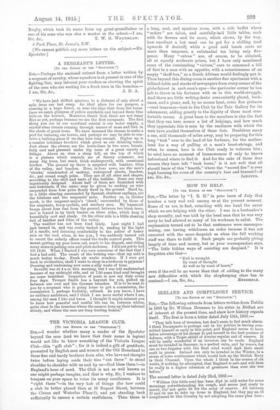A SERGEANT'S LETTER.
[To TAD EDITOR OP THE "SPECTATOR."]
Sin,—Perba,ps the enclosed extract from a letter written by a sergeant of cavalry, whose squadron is at present in rear of the' fighting line, may interest your readers as showing the spirit of the men who are waiting for a fresh turn in the trenches.—
"We have just shifted quarters to a distance of only about a, mile from our last camp. An ideal place for our purpose, a clearing in a huge forest, so near the edge that from the horse- lines we catch glimpses of yellow cornfields and beyond them blue hills on the horizon. Moreover, thank God, there are not many Ries as yet, perhaps because we are the first occupants. The first thing you see in our woodland retreat is our water supply, a crystal-clear stream running through masses of moss and fern in the shade of great trees. We have dammed the stream to make a pool for watering our horses, and perhaps we may be able to con- trive a bathing-place if we stay here long enough. Higher up is a smaller tributary brooklet which gives UB our drinking water. Just above the stream are the horse-lines in two rows, beauti- fully cool and pleasant under big trees of a great variety of foliage. Above us rises a steep hill, on the top of which is a plateau which reminds me of Surrey commons, not many big trees, but much thick undergrowth, with occasional birches. The ground up there is carpeted with heather, lilies of the valley, and bracken. Here, in four rows, are the men's 'shacks,' constructed of sacking, waterproof sheets, bracken, &c., put round rough poles. They are of all sizes and shapes, according to the skill and taste of the builder. Some are very ingeniously designed. About half of them are furnished with real bedsteads, if the name may be given to sacking on -wire suspended from four poles firmly fixed in the ground. Hard by, in a little clearing surrounded by Spanish chestnut saplings, arc the kitchens and the sergeants' mess. Farther on, in thicker scrub, is the sergeant-major's 'shack,' surrounded by those of the sergeants, troop cyclists, and sanitary men. My hammock hangs about four feet from the ground, between two birch trees, and is fenced in by birch bushes on three sides, which keep it beautifully cool and shady. On the other side is a little clearing full of heather and lilies of the valley. The weather has not been kind lately. Last night I had jest turned in, and was cosily tucked in, reading by the light of a candle, and listening comfortably to the patter of heavy rain on tho roof, when, at ton p.m., I as suddenly turned out to escort the orderly officer round the traffic control posts. This meant getting my poor horse out, much to his disgust, and riding many miles in pelting rain and pitch darkness. I did not get to be till 12.30. When I btarted I was very conscious of the fact that I had a bad cold. The result of the wetting was—that my cold is much better to-day. Fresh air works wonders. If I ever get back to civilization, shall I want to sleep in a bedroom in pyjamas ? Dressing and undressing now seem a silly waste of time. Reveilla was at 4 a.m. this morning, but I was left undisturbed because of my midnight ride, and at 7.30 some kind soul brought me some breakfast. Inspection of posts is now my duty every four days. Trooper Smith has a bayonet for you, picked up between our own and the German trenches. It is to be sent to you by a sergeant who is going home to get a commission, the commission I, perhaps foolishly, refused. As you know, I have no military ambitions, and I think I am more useful where I am, among the men I like and know. I thought it might interest you to know how peaceful and restful life can be, between whiles, quite close to the trenches where the cannon keep up their infernal shindy, and where the men are busy hurling bombs,'


































 Previous page
Previous page